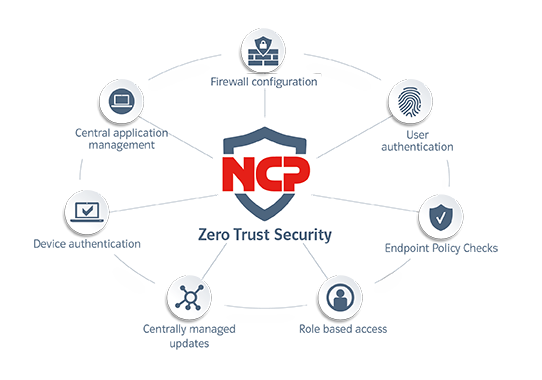Zero Trust for SMEs: Achieving Strong Security with Limited Resources
Zero Trust strengthens SME network security without breaking the bank. Discover practical, cost-effective steps to get started.
![[Translate to Englisch:] [Translate to Englisch:]](/fileadmin/user_upload/NCP_Blog/2024/ZeroTrust_Eisberg.jpg)
Today, no company can do without compliance. We clarify how compliance and Zero Trust are related, how to tell them apart and how they benefit from each other.
The term compliance not only stands for compliance with legal and regulatory requirements, but also for the fulfillment of individual requirements that a company has defined itself. What often sounds unnecessarily complicated actually only means that all employees and the technologies they use meet the various requirements, i.e. must be compliant in order to prevent damage to the company.
The Zero Trust concept also pursues a goal that is very similar at first glance: It is intended to protect the company. Zero Trust is a security model designed to prevent data breaches. This is achieved by making sensitive information accessible only to those employees who actually need it to perform their tasks. At the same time, Zero Trust assumes that there are no longer any trusted networks, servers or end devices. All identities and permissions of users and devices therefore require constant checks and authentication. Access to resources is only granted after authentication is passed and only for a certain length of time.
Compliance and Zero Trust are therefore closely related when it comes to cybersecurity and protecting the company from threats. Zero Trust helps meet compliance requirements by protecting sensitive data and preventing data leaks. Nevertheless, Zero Trust does not replace compliance requirements in a company.
A zero-trust concept consists of numerous building blocks based on the principles above. The Zero Trust implementation offered by NCP engineering consists of several closely interlinked components that together ensure comprehensive protection against cyber attacks. Users are only granted access to the data they need to do their work. Neither users or their devices area considered fully trustworthy, as is the case with the classic perimeter approach.
Zero Trust consists of the following central building blocks:
Zero Trust implementations leave cybercriminals less room to maneuver. Even in the event of a successful attack, the attacker only gains access to a small part of the network. The remaining resources remain off limits. Affected segments can also be isolated more quickly and a threat neutralized without having to shut down the entire system.

The software solutions offered by NCP for secure data communication have been pursuing this approach for several years. In contrast to conventional VPN products, which only open a secure tunnel from the outside into the supposedly always-trustworthy corporate network, these solutions based on the Zero Trust principle offer significantly higher protection. For example, the NCP Secure Enterprise Management (SEM) allows administrators in the company to configure all necessary access rights of entire user groups or even only individual users granularly. This makes it possible to implement the proven principle of Least Privilege.
The key questions in the Zero Trust implementation are:
The answers to these questions determine whether access is allowed or blocked.
Companies benefit from a Zero Trust concept in various ways. By first finding out where data worth protecting is located everywhere and who needs access to it, transparency is increased throughout the network. We are all familiar with the consequences of the Covid pandemic, which drove countless employees worldwide into working from home and continues to create a high demand for secure long-distance connections. Zero Trust also goes far beyond traditional protection concepts through firewalls and classic security solutions by closely linking identities to users, devices and applications.
But back to the question of how compliance and Zero Trust are related. Since every single access in the network must be checked and approved when implementing the Zero Trust principle, it is easier to comply with regulatory requirements. The data collected is not only used for its actual purpose, access control, but often also to document compliance with compliance requirements. Checking the time, location and all applications involved in access requests enables a seamless and transparent audit trail.
In addition, zero-trust implementations facilitate compliance with the General Data Protection Regulation (GDPR), which applies in Europe to all companies that process personal data of EU citizens. Zero-trust measures ensure that only authorized users have access to personal data. They also guarantee that the processed data is stored and transmitted securely. However, the General Data Protection Regulation can also complicate the introduction of a Zero Trust solution. This is especially true if personal data is collected in creating user profiles to evaluate access requests. In this case, a data protection impact assessment must be carried out in advance in accordance with Art. 35 GDPR.
Would you like to find out more about Zero Trust? Please contact us with any questions: NCP implemented Zero Trust even before the term became a buzzword. Trust is good, Zero Trust security is better!